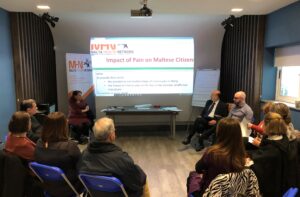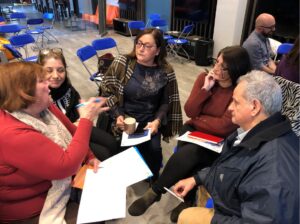SIP Malta has been the first SIP national platform in Europe which has been established in 2016 on the occasion of the SIP 2017 Symposium held in June 2017during the Maltese Presidency of the EU council.
Due to the lack of data on the needs of pain patients in Malta a research project was initiated with public funding from VOPs. The impressing results of the research project have been presented and discussed with policy makers and other stakeholders in a conference in April 2018. It has been identified that
- 20% of Malta’s adult population experience chronic pain – in agreement with the “One in five” data from SIP Europe
- Musculoskeletal diseases including arthritis, joint pains and fibromyalgia make up 75% of causes of chronic pain whilst 20% result from chronic headaches and migraine.
- The majority of pain patients are treated by Family Doctors (nearly 80%)
- Chronic pain leads 86% of sufferers to be absent from work for at least 1 week a year.
Conclusion of the conference in 2018 has been “It is our duty to demand change through these recommendations”:
- Chronic Pain should be acknowledged as a disease in its own right.
- A holistic policy should be drawn up to provide for chronic pain prevention where possible and for timely access to appropriate treatment, medicines and other therapeutic interventions, including rehabilitation.
- Healthcare professionals should have adequate skills in diagnosing and managing pain effectively.
- A National Pain Plan should be established to provide for inter-ministerial collaboration: pain is not only a health issue – it also represents a major contributing factor towards societal wellbeing.
Based on the results of the Malta pain research many materials have been prepared to raise these issues to all stakeholders and especially to policy makers in Malta. For example an infographic video which has also been adapted for use in Ireland since 2019 or a booklet and a leaflet to present the key findings of the research. All materials can be found here.
Although the idea of the national pain plan has not been supported by policy makers SIP Malta will now include pain as a module in the policy work of other disease areas where pain is an important factor to impact the quality of life of patients.
On 16 January 2020, a SIP Malta workshop took place to plan the concrete next steps to bring pain policies forward in Malta. 12 participants from SIP Malta representing clinical experts and patient representatives came together to define what are the most urgent needs of patients and how to address these with concrete actions.
Dr. Mario Grixti (Dep. of Primary Care, B´Kara Health Centre) brought again the most relevant research data from 2018 into their minds and many ideas come up what needs to be changed to improve pain care in Malta.
The participants of the workshop then worked together with the goals to move from raising awareness to shift attitudes and finally to change behaviour.
In a structured approach two parallel working groups (one group represented the patient and the other the healthcare professional perspective) have identified:
- What is the unmet need?
- What is the objective?
- What is the current behaviour? (think, feel, do)
- What is the desired behaviour? (think, feel, do)
- What are the barriers?
- What are the drivers?
After intense sharing of experiences, observations and ideas both groups identified is the most urgent unmet need in Malta is that no adequate pain care in Malta exists. The common objective has been that a patient-centered holistic pain care needs to be achieved.
Patients (group 1) feel frustrated and isolated and do not request adequate management of their disease. Many barriers exist like lack of central point of contact and fragmented pain care where sharing of patients data does not happen and patients are not followed-up. Patients experience stigma and that pain is not taken seriously by their GPs nor by the public.
But there are also opportunities which have been identified like the existing pain research data or the new ICD-11 where pain will be included and will lead to better diagnosis and monitoring of pain current management.
Healthcare Professionals (group 2) identified similar issues and proposed to build a pathway for pain patients to get timely access to health sources in an integrated way. Similar issues exist in other disease areas but there are also good practices to learn from like in diabetes.
Many concrete ideas were collected how to collaborate with other NGOs on these topics to bring the solutions forward. A next SIP Malta meeting will take place in March to make proposals for the Health Strategy Plan in Malta which is currently open for calls.
The participants confirmed that the workshop has led to very good and concrete outcomes and inspired them to take the next steps in their pain policy work.
It is recommended to use the same methodology in other countries as well to tackle the impact of pain on patients but also on the society. Attached you can find the presentations and relevant materials from the workshop.



